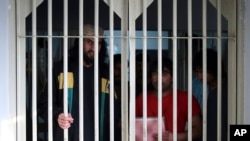The Afghan Taliban said Tuesday they will now approach the Americans to resolve the prisoner release issue, after telling its technical team in Kabul to stop participating in what they called “fruitless meetings” with representatives of Afghan government.
The release of up to 5,000 Taliban prisoners was among the promises in the landmark agreement signed between the U.S. and the Taliban in February.
“We will talk to the Americans and remind them that they made a promise that they need to fulfill. If they fulfill it, this process (of starting negotiations with other Afghans) will move forward. If they don’t, the process will not move forward,” Suhail Shaheen, the spokesman for Taliban’s Doha-based political team told VOA.
He announced the decision to call off talks with the Afghan government early Tuesday morning in a series of tweets.
Shaheen said President Ashraf Ghani’s administration was violating a promise it made in a video conference last month which was also attended by representatives of the United States and International Committee of the Red Cross.
“We all agreed the prisoners will be released on March 31. We were asked to send a technical team to Kabul to identify and verify our prisoners. When we sent our team, the Kabul administration did not fulfill its promise. Instead, it is using delaying tactics,” Shaheen said.
The Afghan government, on the other hand, blamed the delay on the Taliban. Matin Bek, the head of the Independent Directorate of Local Governance, told journalists Monday in Kabul that the Afghan government was ready to release 400 Taliban prisoners instantly, but the Taliban wanted the release of 15 senior commanders who had been involved in major attacks and were believed to be a serious security risk.
If those commanders returned to the battlefield, he said, it might lead to some of the provinces falling into the Taliban hands.
He added that the government wanted to start the process with lower level Taliban fighters and then release the rest in phases in return for a reduction in violence as well as a guarantee that the released prisoners would not return to the battlefield.
Shaheen denied that the 15 were senior commanders.
“These 15 were selected from the list of 5,000 prisoners because they can help in identification and verification of other Taliban prisoners,” he said.
He added that the Taliban have already guaranteed, as part of the agreement with the United States, that its prisoners would not return to the battlefield.
The agreement between the U.S. and Taliban, signed in Doha Feb. 29, said up to 5,000 Taliban prisoners, and up to 1,000 prisoners from the other side, would be released by March 10, 2020, a date that has long passed.
The release was supposed to jump start the second phase of the agreement, a formal negotiation process between the Taliban and other Afghans, called intra-Afghan negotiations.
The Ghani administration has announced a 21-member team to negotiate with the Taliban that seems to have received widespread acceptance.
The Taliban originally issued a statement rejecting the team as non-representative but Shaheen said they might reconsider.
“We received a complaint from them (various Afghan factions) that it was a government team. If everyone says it’s a representative team then we will reconsider our stance,” he said.
Shaheen said the Taliban were still committed to the agreement they signed but accused the other side of violating its terms by attacking its forces not engaged in a battle. The agreement, he said, allowed for self-defense but not initiating attacks.
A spokesman for the U.S. forces in Afghanistan, Colonel Sonny Leggett called these accusations “baseless.”
“USFOR-A has upheld, and continues to uphold, the military terms of the U.S.-TB agreement,” he tweeted but added that they would defend their Afghan partners if attacked.
The U.S.-Taliban agreement said a permanent and comprehensive cease-fire would be an item on the agenda of the intra-Afghan negotiations.






